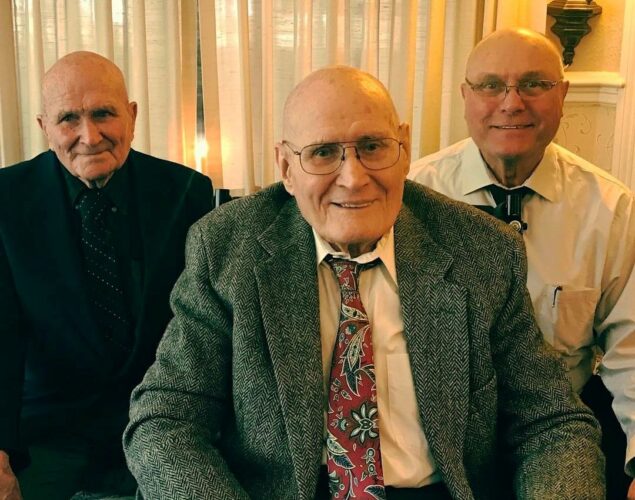
My reloading mentors: my dad (center), Uncle Ken (left), and Uncle Gary (right). Photo by Steve Sorensen
Anyone can knock me down and make me say “Uncle” but I say it with joy because God has blessed me with some brave uncles on both my maternal and paternal families.
My dad’s two brothers, the oldest and the youngest, were very instrumental in teaching me how to load ammunition. Ken is a World War II veteran who is soon to be 99 years old. Many locals in the old windmill fastpitch softball league in Warren, Pennsylvania remember him as an outstanding pitcher. One summer he beat the King and His Court softball team, led by the famous Eddie Feigner. Eddie hated to lose.
As time goes by, my memories of Uncle Ken are slowly fading, but I still love him for all he did for me. I tried so hard to imitate his pitching style that it got me into trouble many times. One thing I regret is that he would have helped me if only I had asked, but I didn’t. Learn this lesson sooner. It’s okay to ask for help.
Ken still remembers and respects me, but forgets that he hand-loaded the bullets I used to shoot my first deer. The bullets that came from his powerful right arm were unpredictable and reliable, but the bullets from his rifle were absolutely reliable.
My first deer hunting rifle was a Savage Model 340 in .222 Remington caliber. While not the best medicine for whitetail hunting, the 63 grain Sierra bullets did a good job taking down a 5 point buck. When Ken got me interested in loading bullets, my dad thought we should roll our own. So it became a given that we would give gifts to Steve every Christmas and birthday.
As a high school student, I unpacked a press heavier than any you can buy today, cartridge dies to fit that massive press, a powder scale sensitive enough to weigh pencil checkmarks on a scrap of paper, and a few auxiliary tools, branded Herter’s of Waseca, Minnesota. (Cabela’s was still primarily in the dry fly business.) My dad and I learned about powder burn rates, and together we solved the problem of jammed cases.
My learning curve was punctuated by stints living in Boston, Kansas City, a small town in North Carolina, and the nation’s capital. It felt a lot longer than 11 years, but when I returned, my dad’s youngest brother, Gary, became my reloading mentor. Gary was four years older than me, and his wife was my high school classmate. Together we began pressing brass into reloading dies, and he introduced me to some of the newer reloading tools made by Redding, Lee, RCBS, and Dillon Precision.
My personal Harter base was set up in my dad’s basement until the end of his life. Whenever we were collecting ammo he would say, “This is all yours, make sure you get it when I’m gone.” I did, and that old Harter scale is just as accurate today as it was back in ’19.
That was a long time ago. Time is what all men try to resist, and all men cannot resist it. Gary now has something sad in common with Lou Gehrig. Yes, ALS is a devastating disease, but it has not dampened Gary’s courage, changed his gratitude, stopped him smiling, or made him less interested in anything.
When I spent a day with Uncle Gary in the spring, he mentioned he wanted to reload his .44 Magnum. The operation of his Dillon Progressive Reloader was automatic — depriming, sizing, repriming, loading powder, bullets, crimping the neck — but he didn’t have the strength to pull the handle. But his mind was clear enough to show me how to use the press, which was more complicated than what I was accustomed to.
Reloading can be as simple or as complex as you want it to be.
You might reload to save money. You might reload to shoot more accurately. You might reload to shoot more and improve your shooting skills. You might reload to relax. But nothing beats the fact that reloading gives you a valuable and unforgettable mentor. Or maybe you become someone’s mentor. That’s why when we say “uncle,” we think of reloading.
welcome
When the “Everyday Hunter” isn’t hunting, he’s thinking about hunting, talking about hunting, dreaming about hunting, writing about hunting, or wishing he could hunt. If you’d like to tell Steve exactly where your favorite hunting spots are, contact him through his website at www.EverydayHunter.com. Steve has contributed articles to top outdoor magazines and is the recipient of a national “Pinnacle Award” for outdoor writing in 2015, 2018, and 2023.

